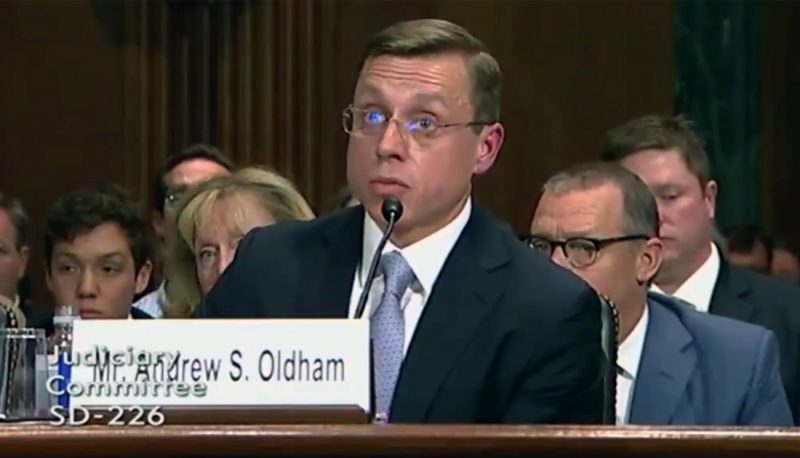“Our Courts, Our Fight” is a blog series documenting the harmful impact of President Trump’s judges on Americans’ rights and liberties and the need for the Senate to confirm President Biden’s federal court nominees to help counteract these effects . Supreme and appellate court cases in the series can be found by issue and by judge at this link.
Trump Fifth Circuit judge Andrew Oldham wrote a decision, joined by Trump judge Cory Wilson, staying an FDA ruling that a corporation could not continue to market flavored e-cigarettes and suggested the ruling would likely be reversed, despite the demonstrated harm of such e-cigarettes to children and adolescents. The October 2021 decision was in Wages and White Lion Investment v US Food and Drug Administration.
Beginning in 2016, e-cigarettes and vaping products became subject to regulation by the Food and Drug Administration (FDA), as with other tobacco products. Although the FDA took no action on such products for several years, a federal court ordered in 2019 that companies had to submit applications for their products to stay on the market by the fall of 2020, and the FDA had to review those applications within a year. The focus of the FDA review was whether an e-cigarette or vaping product had enough benefits to adult smokers, such as helping them to quit smoking actual cigarettes, to “outweigh the risk of attracting kids and teenagers” to smoking.
In the fall of 2021, the FDA authorized several such tobacco-flavored products, finding that their sale would be “appropriate for the protection of public health” under these criteria. The FDA also determined, however, that a number of “flavored” e-cigarette or vaping products, which have tastes like “fruit, candy or mint,” cannot be marketed because of the evidence showing “risks” that children and teens would be attracted to and begin using such products “and then switch to higher-risk products,” including “combusted cigarettes.”
One of the e-cigarette companies selling flavored products that received a marketing denial order was Triton (part of Wages and White Lion Investments LLC), which had been selling flavored e-cigarettes in Texas and elsewhere. Triton petitioned the Fifth Circuit Court of Appeals to review and reverse the FDA decision. In a ruling by Trump judge Oldham, joined by Trump judge Wilson and a judge nominated by President George W. Bush, the court granted an indefinite stay of the FDA decision, authorizing the continued marketing of Triton’s products while the case continues, and indicated that there was a “strong likelihood” that Triton will succeed in its action against the FDA. The court was particularly critical of what it called a “surprise switcheroo” because after indicating in 2019 that it did “not expect” that companies would need to submit long-term studies to support their applications, the FDA decided in 2021 that such studies were required and denied applications like Triton’s that did not have them. The court also maintained that the FDA did not “reasonably consider” Triton’s proposed marketing plan and other evidence, and that it would likely find that the FDA decision was “arbitrary, capricious, or otherwise unlawful.”
The panel’s decision largely ignored the arguments of the FDA. The agency explained that its 2019 guidance had expressly stated that it was “nonbinding”, that it did discuss the importance of having “other valid scientific evidence,” and that its determination several years later that long-term studies were needed was based largely on the recent “epidemic” of e-cigarette use by “children and adolescents,” which has been “fueled” by the availability of “candy and fruit” flavors in e-cigarettes. As to Triton’s marketing argument, the FDA noted that it “echoes familiar tobacco-industry claims” and that it had found that there were no marketing or access restrictions that “have been successful in sufficiently decreasing the ability of youth to obtain and use e-cigarettes.” Overall, it is clear that the court was substituting its own judgment for that of the expert agency. And it dismissed in one sentence the FDA’s detailed argument that under the statute, the court did not have the authority to grant a “stay” that would allow Triton to “lawfully market its products.”
What will happen in the future in this case, or in other corporation challenges to FDA restrictions on e-cigarettes, is unclear. But as Senator Dick Durbin has explained in criticizing even the FDA’s decision to permit marketing of tobacco-flavored e-cigarettes, the issue presents a “life-or-death challenge” because of the “epidemic” of “youth e-cigarette use.” The preliminary decision from Trump judges Oldham and Wilson can only make this epidemic even worse. It is crucial that, as part of our fight for our courts, the Senate confirm fair-minded judges who will respect the expertise of agencies like the FDA on health and safety issues.

